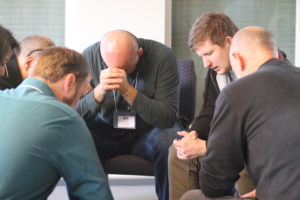Our Family: Celebrating in the Midst of Disagreements
A common reaction of many people to Baptists is that they can much more quickly tell you what you can’t do than to tell you what you can do. It is a common perception.
Some people hear “Baptist” and think “no fun there.” Others recognize a tradition that takes seriously the application of Scripture to life. Unfortunately, sometimes we allow this seriousness in our approach to God’s Word to break apart our communities.
Long before there were Baptists of any kind, the Apostle Paul was challenging some negative tendencies that he was seeing in the Galatian churches. I believe his final remarks are helpful for any group of churches as they wrestle with their differences.
As we consider the theme of “Celebrating Our Family,” let me ask, “How do we celebrate our family when we disagree over some important issues — issues that some consider as central to the gospel, but that others see as secondary?” As I was preparing for our Annual Convention Meeting and broaching a highly charged topic, I was trying to remember where in the New Testament it talked about biting and devouring each other, a context where brothers and sisters in Christ might be tearing each other apart like wild dogs, and what the Scripture teaches. Let me offer three commandments from Galatians 5-6, and then paint a picture of what that might look lived out.
First commandment: Love (Galatians 5:13-16)
“For you were called to freedom, brothers and sisters; only do not use your freedom as an opportunity to indulge your flesh, but through love serve one another” (5:13 NET).
For much of this epistle Paul has been dealing with legalism, which is clearly in contrast to freedom in Christ. We don’t add our work to Jesus’ work for salvation. But here, Paul makes another contrast. Freedom is not libertinism. Freedom does not mean that you can just treat people any way you feel like just because they do not agree with you.
Over the years I have never forgotten a quote that resonated with me back in my days studying at seminary. In a leadership magazine interview, Brian McLaren said, “There is a reality that many pastors secretly acknowledge but seldom verbalize: that too many of our most ‘educated’ Christians are some of the meanest. They may know more information about the Bible but are the least Christ-like. Too often there seems to be a direct correlation between knowledge about theology on the one hand and arrogance, contentiousness, and an uncharitable spirit on the other.” Most of us have to admit that we have seen this sad reality.
The freedom Paul commands here is not freedom to devour but freedom to love. It is love that is the ultimate expression of the fulfillment of the law in us (5:14). Jesus taught love as the greatest commandment and because of love, Jesus volunteered for the cross.
Second commandment: Look for God’s Spirit (Galatians 5:16-26)
“For the desires of the flesh are against the Spirit, and the desires of the Spirit are against the flesh, for these are opposed to each other, to keep you from doing the things you want to do. But if you are led by the Spirit, you are not under the law. … If we live by the Spirit, let us also keep in step with the Spirit. Let us not become conceited, provoking one another, envying one another” (5:17–26 ESV).
Paul has shown us that liberty is an opportunity for the flesh, but it is also an opportunity for God’s Spirit. Galatians 5:16 follows the formula of a commandment with a promise: “But I say, live by the Spirit and you will not carry out the desires of the flesh.” The encouragement that I find here is to look for evidence of God’s Spirit in one another.
Third commandment: Carry each other’s load (Galatians 6:1-5)
“Brothers and sisters, if a person is discovered in some sin, you who are spiritual restore such a person in a spirit of gentleness. Pay close attention to yourselves, so that you are not tempted too.” (6:1 NET)
When I was a teenager, I earned money by delivering newspapers in my neighborhood. I also collected baseball cards, so I don’t know how much money made it into my savings account. Often upon completing my newspaper route I would stop at the pharmacy and buy my baseball cards (and chew that special gum that was inside). The pharmacy also contained a magazine rack and on part of that rack, behind a cover, were the pornographic magazines. Whenever I have read this passage, I have imagined walking into the pharmacy and “a person is discovered in some sin.” At that moment, I have a great opportunity, by the grace of God, to gently lift that brother or sister out of a sin that they might have continued to persist in, had it not been for God putting me there to catch them.
Paul does not specify what kind of sin he is thinking about. There is obviously much broader application than pornography. Consider how the application could extend even to the way that we treat one another as we wrestle with issues. “Carry one another’s burdens, and in this way you will fulfill the law of Christ. For if anyone thinks he is something when he is nothing, he deceives himself. Let each one examine his own work. Then he can take pride in himself and not compare himself with someone else. For each one will carry his own load.” (6:2–5 NET). Here we see both corporate and individual responsibility as we encourage each other to be obedient to the Lord.
The bottom line is that gospel-found freedom preserves God’s church and produces godly disciples. Let me offer some suggestions for application in our convention in the form of horizontal and vertical lines:
- Young disciples need to become mature, and mature disciples can act immaturely.
When Paul confronted Peter in chapter two, he called him a hypocrite, not an apostate. Peter’s salvation was not in question. Peter was a mature believer, an apostle, but this was not Peter at his best.
In preparation for our discussion of the difference of views about women and men in partnership for the gospel, one pastor told me how surprised he was to discover that a fellow pastor held the opposite view from him. At the same time, there was greater empathy in the discussion because of the depth of Spirit-filled living and disciple-making results that were evident in this brother who held a different position.
Regarding infant baptism, one pastor said that he doesn’t like to offer associate membership to those have not been baptized as believers. Rather than offering an alternative option to membership, he wishes people would respond to baptism. Yet if he does not offer people an opportunity to belong, they may leave. By focusing on discipleship instead of membership, people stay and as they mature and desire to obey Christ many request to be baptized. This is a horizontal line issue because we are all on a journey of maturing as disciples.
- Bridges, not walls, open us up to grow from each other.
Consider a second horizontal line, a continuum, and on either end are you and me. The extreme sides of the continuum represent two sides of an issue that we are wrestling with. In between you and me are other people, some line up closer to you and others closer to me. Let me suggest that these verses encourage us to build bridges and not walls.
One IBC pastor said, “It bothers me that R.C. Sproul could not have been a member of my church. I am so grateful for Sproul and his teaching, but we believe that the Scriptures very clearly teach baptism by immersion and it is a membership requirement.” What we do with membership, especially, with the diversity of church backgrounds in our congregations is a big challenge. That is why it is so important to work this out on a local-church level. If we can discuss issues that we disagree on in a way that God blesses, then we build bridges and not walls. We offer each other an opportunity to grow instead of letting our disagreements divide us.
The last line is a vertical line. It represents our relationship to God. As we examine difficult issues against the Scriptures, we cannot simply dismiss conviction as a difference of opinion, not even between well-meaning mature disciples. There are issues for which we must give an account before the Lord, and ultimately “each one will bear his own load” (6:6 NET). As one pastor said, “Show me what I am not seeing. I am ready to change if someone can point out to me what I am missing. This is a matter of conscience.” The question of horizontal-line relationships cannot exclude the vertical relationship. God’s opinion matters most.
When the local IBC church joined our Italian church in Naples, they were 30 people. Not one of those came from a Baptist background and yet they requested that we remain in the IBC because for them being Baptist meant being part of a church that faithfully taught the Word of God.
Baptists are people of strong conviction. There are various issues in the IBC that could break apart our community. At the same time, IBC churches welcome people from three quarters of the nations of the world. The people in our churches are diverse. In conclusion let me ask you, “How do you maintain the horizontal lines while being faithful to the vertical line? How do you preserve the church while producing godly disciples?”
Paul was dealing with a problem that threatened the gospel and yet he called us to love, to look for God’s Spirit, and to lift one another up with a goal of a reconciled relationship with God. The apostle concluded that gospel-found freedom preserves God’s church and produces godly disciples. May the Lord lead us to do the same!

by Tim Faulkner
General Secretary


